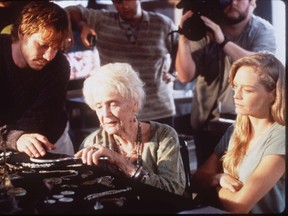
A privacy commissioner report says Halifax police must release more details about the spiked chowder that sent the film crew to hospital
Article content
The mystery of how the hallucinogenic drug PCP was used to secretly spike lobster chowder on the Nova Scotia set of the 1997 blockbuster movie Titanic might be closer to being solved.
Whoever dosed that fateful pot of soup in the Dartmouth, N.S., catering truck sparked one of the most strange, dangerously illegal, and yet still weirdly charming episodes in the history of Canada’s film-production industry. Nearly three decades later, it remains widely remembered and frequently retold as a shambolic drug-addled hilarity, like Hollywood meeting the Trailer Park Boys.
Advertisement 2
Article content
Article content
And now, thanks to a ruling of Nova Scotia’s Information and Privacy Commissioner, new information is set to emerge about that summer night when dozens of actors, film crew, and even director James Cameron himself went to hospital after midnight, causing a huge scene. At first, some of the victims suspected shellfish poisoning, but doctors soon pieced it together.
Many of them were anxious and freaking out, their eyes bloodshot, but many others thrilled to the high, talking a mile a minute and dancing Conga lines through the Dartmouth General emergency department.
“I feel like I’m on something, and believe me, I would know,” one of the electricians said.
Recommended from Editorial
-

Cameron sees similarities between sub disaster and Titanic
-

Gene Wilder’s final words revealed by his widow: ‘I love you’
The late actor Gloria Stuart, then aged 86, who played a survivor of the shipwreck in the movie’s modern-day scenes — with her frequently memed line, “It’s been 84 years” — luckily did not eat any of it. Children on set were similarly fortunate to skip the chowder. Not so Bill Paxton, one of the movie’s stars, who decided to leave the “bedlam” at the hospital and go for a wander, and later described keeping his own private party going until dawn with a case of beer.
Article content
Advertisement 3
Article content
In a decision dated March 28, Nova Scotia’s Information and Privacy Commissioner, Tricia Ralph, has decided Halifax Regional Police should release further details from a 10-page “rapid incident report” that describes the initial investigation and includes witness information from people on set and from health-care providers at the hospital.
An applicant, unnamed in the report, asked Halifax Regional Police for records relating to the incident, but the police withheld some of the requested information on the grounds that it would reveal protected aspects of intergovernmental affairs, law enforcement tactics and personal information.
The applicant objected to these redactions and asked the commissioner to review them.
Ralph found that the personal information exemption stands up, but the other two are not justified. She ruled the police force “was not authorized to withhold information” on the grounds of intergovernmental affairs or law enforcement, in some cases because the information is older than a 15-year protection window.
“She finds that with personal identifiers withheld, factual observations of third parties do not constitute their personal information and so cannot be withheld,” the decision reads.
Advertisement 4
Article content
As a result, Ralph’s order recommends the Halifax Regional Police release information wrongly withheld on these grounds. It does not specify what that information is, other than that it includes details of witness statements.
Ralph’s report describes “dozens” of crew members eating food “allegedly laced” with the drug phencyclidine, commonly known as “angel dust.”
“That’s kind of a crazy story,” Paxton once told Larry King.
They were shooting at night on a research vessel with submersibles for the modern-day scenes of exploration that frame the historical story of the Titanic’s sinking. Leonardo DiCaprio and Kate Winslet, who played the central characters Jack and Rose, were not involved.
Paxton described eating chowder with Cameron, then later hearing a commotion as emergency services started showing up in response to 911 calls. Eventually, about 80 people went to Dartmouth General Hospital.
“Some people are freaking out, some people are Conga dancing, some people are euphoric,” Paxton said. “I knew I was pretty stoned on something pretty bad. Me and Jim (Cameron) thought there was a neurotoxin in the clams. We didn’t know what it was. We thought maybe the clams had been left out in the sun or whatever.”
Advertisement 5
Article content
A couple of years ago, Vulture interviewed some of the crew members.
“We had a room for the grips and electricians, and one of the guys started talking really hyper,” one of them told Vulture. “He’s a big guy, like six-four, and he says, ‘Do you guys feel okay? Because I don’t. I feel like I’m on something, and believe me, I would know.’ He was just chattering on like that. And just as he was saying this, we saw James Cameron run by the door and this extra running behind him. He said, ‘There’s something in me! Get it out!’”
The hospital was “bedlam,” so Paxton decided to wander and put back a case of beer. That is not a medically recommended antidote to PCP overdose, but Paxton told King it seemed to sort him out.
Cameron, in typically grand fashion for a man who once called himself the King of the World at the Oscars, once told CBC: “You haven’t lived until you’ve been high on PCP, which by the way, I do not recommend to anyone.”
Cameron’s theory was that someone had targeted the caterers.
Our website is the place for the latest breaking news, exclusive scoops, longreads and provocative commentary. Please bookmark nationalpost.com and sign up for our newsletters here.
Article content

